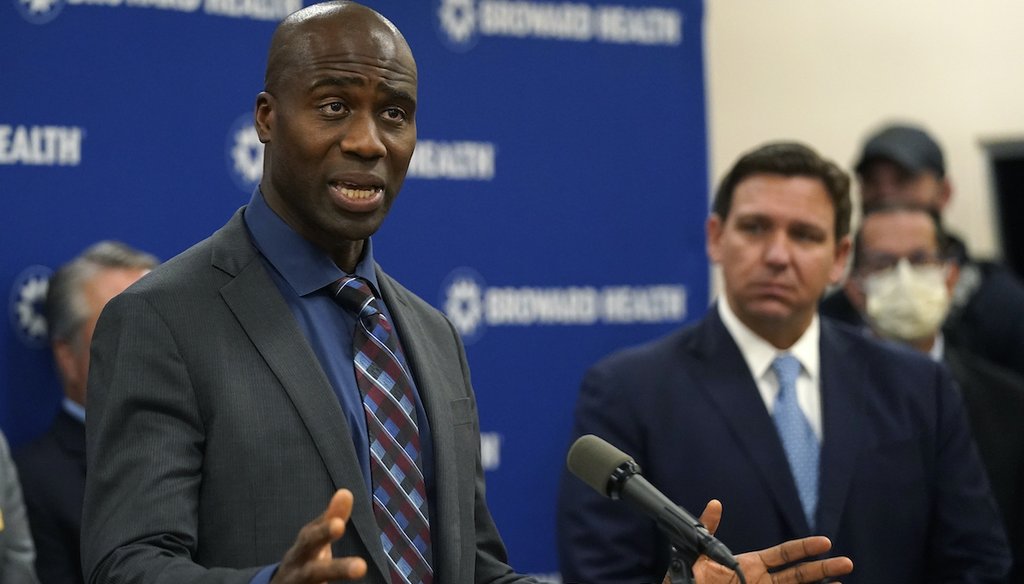Stand up for the facts!
Our only agenda is to publish the truth so you can be an informed participant in democracy.
We need your help.
I would like to contribute

Florida Surgeon General Dr. Joseph Ladapo speaks at a news conference with Florida Gov. Ron DeSantis, right, on Jan. 3. On March 7, Ladapo said the state would formally recommend against COVID-19 vaccinations for healthy children. (AP)
If Your Time is short
-
Ladapo has recently said masks “are not saving lives,” and announced his state would become the first to recommend that healthy children over age 5 not receive the COVID-19 vaccine. He has said the science behind Centers for Disease Control recommendations to the contrary is lacking.
-
Dr. Wafaa El-Sadr, a professor of epidemiology and medicine at Columbia University, said that Ladapo’s comments are outside the norm for public health officials, who usually apply CDC guidelines “locally with minimal adjustments.”
A public reckoning with science in Florida has intensified in recent weeks — led by the state’s top health official.
Surgeon General Dr. Joseph Ladapo announced Florida would be the first state to recommend against COVID-19 vaccines for healthy children.
Ladapo has made it clear he believes the science behind COVID-19 recommendations from the U.S. Centers for Disease Control and Preventions is lacking.
A week earlier, Ladapo took aim at masking during a March 3 press conference. "No high-quality data says that this (a mask) saves any lives. It’s a lie, and it needs to stop, and people need to unbelieve it," he said.
Ladapo’s departure from CDC guidelines is outside the norm for public health officials.
Sign up for PolitiFact texts
Until the COVID-19 pandemic, general clinical practice guidelines from the CDC about things like vaccinations, HIV or tuberculosis, for example, "have been applied locally with minimal adjustments," said Dr. Wafaa El-Sadr, a professor of epidemiology and medicine at Columbia University. She described Ladapo’s comments as "highly unusual and concerning."
The Florida Chapter of the American Academy of Pediatrics called Florida’s recommendation against COVID-19 vaccinations for kids "irresponsible." The organization and the American Academy of Pediatrics recommend that all eligible children age 5 and older get the COVID-19 vaccine as soon as possible, citing research that shows vaccines reduce serious illness, hospitalizations and long-term COVID-19 symptoms.
We reached out to Ladapo’s team to try to understand what evidence supports these positions. The science surrounding COVID-19 has evolved, so the policies and guidance have evolved as well. Still, public health studies and expert review continue to bolster the case for vaccines and the usefulness of masks in stemming spread in high-transmission areas.
Studies haven’t shown vaccine risks outweigh benefits
The Florida Department of Health released new guidelines on vaccines for kids on March 8, less than two weeks after Ladapo, a Harvard-educated doctor and former UCLA professor, was confirmed to his position as Florida’s surgeon general.
"Healthy children aged 5 to 17 may not benefit from receiving the currently available COVID-19 vaccine," the guidance read. "The Department recommends that children with underlying conditions are the best candidates for the COVID-19 vaccine."
Ladapo emphasized personal choice in a statement issued with the guidelines: "Based on currently available data, the risks of administering COVID-19 vaccination among healthy children may outweigh the benefits."
When we asked for Ladapo’s evidence, spokesperson Jeremy Redfern pointed us to two studies. Neither study concluded that the risk of a severe reaction from a vaccine outweighed the risk of contracting COVID-19.
In one, researchers from the New York State Department of Health and the State University of New York compared laboratory-confirmed COVID-19 outcomes — including cases and hospitalizations — by vaccination status to estimate how effective vaccines were during a surge fueled by the highly infectious omicron variant.
The study, which had not been peer-reviewed, found that between Dec. 13, 2021, and Jan. 30, 2022, vaccine effectiveness against COVID-19 cases for fully-vaccinated children ages 12 to 17 declined from 66% to 51%. For children ages 5 to 11, it dropped from 68% to 12%. The data also showed declines in its effectiveness against hospitalizations, dropping from 85% to 73% in the older children and from 100% to 48% in the younger group.
Nevertheless, the researchers still recommended vaccination for kids 5-11, saying that it "was protective against severe disease."
The second study Ladapo’s team cited, this one published in the New England Journal of Medicine, was a randomized clinical trial evaluating the effectiveness of the Pfizer and BioNTech COVID-19 two-shot, low-dose vaccine in children ages 5 to 11. The trial involved 2,268 children and concluded that a two-dose COVID-19 vaccination administered 21 days apart was "safe, immunogenic, and efficacious in children 5 to 11 years of age." No vaccine-related serious adverse events were noted, the authors wrote.
Redfern argued, however, that the study was "underpowered" compared with a similar clinical trial for adults that enrolled 43,548 participants.
The adult trials needed more participants to directly measure the effectiveness of the vaccine, according to the National Institutes of Health. With the effectiveness established in adult trials, the clinical trial for kids was smaller and focused on measuring immune response to the vaccine and tracking effects.
Researchers behind the work Ladapo cited have since said the surgeon general cherry-picked parts of studies that seemed to bolster his pre-existing beliefs or pulled their words out of context, according to Tampa Bay Times reporting.
Dr. Adriana Cadilla, a pediatric infectious disease physician at Nemours Children's Hospital in Orlando, Florida, told PolitiFact that the safety of the COVID-19 vaccine was well documented.
"We’ve never seen the extent of safety monitoring like we’re seeing now," she said. "What I see in my practice is a lot of kids coming in with heart problems with acute COVID or with post-COVID syndrome. You don't see them coming in with vaccine-related problems — they exist, but the chances of having an adverse event from the actual disease is much higher."
While research suggests the COVID-19 vaccines can cause a slightly increased risk of myocarditis — inflammation of the heart — in some adolescents, it is rare.
Robert Heimer, a professor of epidemiology at the Yale School of Public Health, said that the health risks of the vaccines "have been shown to be very infrequent and minor." He said that half of all childhood COVID-19 deaths have occurred since the omicron surge began.
Evidence suggests masks provide protection
Ladapo based his claim that masks "are not saving lives" primarily on available controlled clinical trials, which he referred to in the press conference as the "highest level of evidence."
Controlled clinical trials sort participants into two groups — an experimental group and a control group — to study the effect of a particular variable on outcomes.
His team pointed to a Danish study from 2020 known as DANMASK-19 and another from Bangladesh that was published in December 2021.
According to Ladapo, "one found nothing. Zero benefit. The other found a small benefit — like a tiny benefit that’s a little bit methodologically shaky. And by the way, none of them found a benefit in young people. Not a single one found a benefit in younger people."
Neither assessment accurately portrays the findings of those studies.
The first, conducted in Denmark early in the pandemic, found that wearing masks did not offer a very high level of protection to mask wearers when they were in communities where wearing masks was not common practice — but the data suggested masks did provide some degree of self-protection.
The second, from Bangladesh, concluded that promoting masks "increased mask usage and reduced symptomatic SARS-CoV-2 infections, demonstrating that promoting community mask-wearing can improve public health." It also showed that surgical masks are more effective at preventing COVID-19 transmission than cloth masks. Some researchers have since called its findings into question, however, because of concerns that the results might have been different had they analyzed the raw data differently.
Redfern criticized other studies on the subject, saying they were observational or survey studies that had higher potential for bias.
Kate Grabowski, an epidemiologist and assistant professor at Johns Hopkins University, said "any one study on its own has a number of weaknesses" but "the body of evidence together strongly suggests ‘masking saves lives.’"
A January 2021 review of available mask literature conducted by researchers from the University of San Francisco, Brown University and elsewhere concluded: "The preponderance of evidence indicates that mask wearing reduces transmissibility per contact by reducing transmission of infected respiratory particles in both laboratory and clinical contexts."
Dr. Monica Gandhi, a professor of medicine at the University of California San Francisco, said that "most well done studies" of mask mandates "do not show an association between mask mandates and the containment of spread or hospitalizations."
"However, that doesn’t mean masks ‘don’t work’ at the individual level," Gandhi said. She noted that research shows masks protect those who wear them.
RELATED: What pediatricians want parents to know about the upcoming COVID-19 shots for children under 5
RELATED: No, a Danish study didn’t prove wearing masks is ineffective
RELATED: Why randomized controlled trials on mask wearing and the coronavirus are scant
CORRECTION (March 19, 2022): Monica Gandhi is a professor of medicine at the University of California San Francisco. An earlier version of this story had the university name wrong.
Our Sources
WFLA, "DeSantis, Florida Surgeon General push bill that would protect medical workers from censorship," March 3, 2022
Email exchange and phone interview with Jeremy Redfern, a spokesperson for Dr. Joseph Ladapo, March 3 and 10, 2022
Email interview with Dr. Monica Gandhi, a professor of medicine at the University of California San Francisco, March 4, 2022
Email exchange with Kate Grabowski, an epidemiologist and an assistant professor in pathology at Johns Hopkins University, March 4, 2022
Email interview with Jill Roberts, associate professor at the University of South Florida’s College of Public Health, March 3, 2022
Email interview with Dr. Wafaa El-Sadr, a professor of epidemiology and medicine and the director of the Mailman School of Public Health’s Global Health Initiative at Columbia University, March 11, 2022
Email interview with Robert Heimer, a professor of epidemiology and pharmacology at the Yale School of Public Health, March 14, 2022
Tampa Bay Times, "DeSantis presses Florida Legislature to pass doctor ‘free speech’ bill," March 3, 2022
PolitiFact, "Why randomized controlled trials on mask wearing and the coronavirus are scant," March 12, 2021
PolitiFact, "‘Fauci lied:’ How misunderstanding about science and public health has helped fuel false claims," Feb. 24, 2022
PolitiFact on YouTube, "Mask skeptic vs The facts," March 25, 2021
Harvard Health Publishing - Harvard Health Medical School, "Masks save lives: Here’s what you need to know," Jan. 15, 2022
NIH Director’s Blog, "Masks Save Lives," Aug. 25, 2020
Nature, "Face masks: what the data say," Oct. 6, 2020
University of California San Francisco, "Still Confused About Masks? Here’s the Science Behind How Face Masks Prevent Coronavirus," June 26, 2020
PolitiFact, "No, a Danish study didn’t prove wearing masks is ineffective," Dec. 7, 2020
Johns Hopkins Bloomberg School of Public Health, "The Impact of Community Masking on COVID-19: A Cluster-Randomized Trial in Bangladesh," Aug. 31, 2021
Tampa Bay Times, "COVID researchers: Florida ‘cherry-picked’ our work in kid vaccine recommendation," March 11, 2022
Science.org, "Impact of community masking on COVID-19: A cluster-randomized trial in Bangladesh," Dec. 2, 2021
Ben Recht’s blog, "Revisiting the Bangladesh Mask RCT," Nov. 23, 2021
The Atlantic, "One-Way Masking Works," Jan. 10, 2022
MedRxiv, "Mask mandate and use efficacy for COVID-19 containment in US States," Aug. 7, 2021
National Center for Biotechnology Information, "Analysis of the Effects of COVID-19 Mask Mandates on Hospital Resource Consumption and Mortality at the County Level," Sept. 3, 2021
U.S. Centers for Disease Control and Prevention, "Effectiveness of Face Mask or Respirator Use in Indoor Public Settings for Prevention of SARS-CoV-2 Infection — California, February–December 2021," Feb. 4, 2022
PNAS, "An evidence review of face masks against COVID-19," Jan. 11, 2021
PolitiFact, "Ask KHN-Politifact: Is my cloth mask good enough? The 2022 edition," Jan. 12, 2022
Johns Hopkins, "The Impact of Community Masking on COVID-19: A Cluster-Randomized Trial in Bangladesh," Aug. 31, 2021
PolitiFact, "Mask skeptics ask questions. PolitiFact answers," March 16, 2021
Florida Department of Health, "Guidance for Pediatric COVID-19 Vaccines," March 8, 2022
FloridaHealth.gov, "Florida Department of Health Issues New Guidance Regarding COVID-19 Vaccination Recommendations for Children," March 8, 2022
NBC News, "Florida surgeon general recommends against Covid vaccination for 'healthy' children," March 8, 2022
ABC News, "Florida to recommend against COVID vaccines for healthy kids," March 7, 2022
WFLA News 8, "Florida releases new COVID-19 guidance, says vaccines may harm healthy children," March 8, 2022
Youtube, DeSantis Roundtable on COVID-19: "The Curtain Close on COVID Theater," March 7, 2022
Florida Chapter of the American Academy of Pediatrics "FCAAP Statement Regarding the COVID-19 Vaccine and Florida’s Children," March 7, 2022
MedRXiv, "Effectiveness of the BNT162b2 vaccine among children 5-11 and 12-17 years in New York after the Emergence of the Omicron Variant," Feb. 28, 2022
New England Journal of Medicine, "Safety and Efficacy of the BNT162b2 mRNA Covid-19 Vaccine," Dec. 31, 2020
New England Journal of Medicine, "Evaluation of the BNT162b2 Covid-19 Vaccine in Children 5 to 11 Years of Age," Nov. 9, 2021
American Medical Association, "What doctors wish parents knew about kids' COVID-19 vaccine safety," Jan. 21, 2022
Centers for Disease Control and Prevention, "Myocarditis and Pericarditis After mRNA COVID-19 Vaccination," accessed March 11, 2022
National Geographic, "The real risk of heart inflammation to kids is from COVID-19—not the vaccine," Nov. 23, 2021
Infectious Disesaes of America, "IDSA: Florida is Putting Children in Harm’s Way with New Vaccination Policy," March 8, 2022
WUSF, "Pediatrician pushes back against Florida's new COVID-19 vaccine guidance for kids," March 10, 2022
National Institutes of Health, "Ensuring Vaccine Safety for Children," Oct. 26, 2021






























